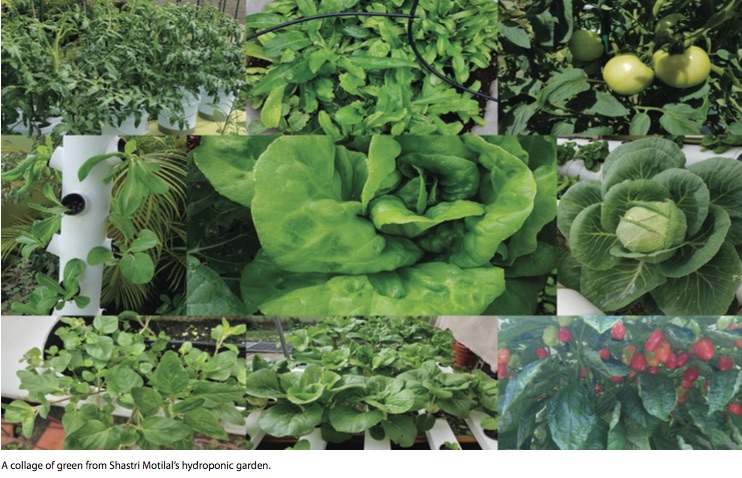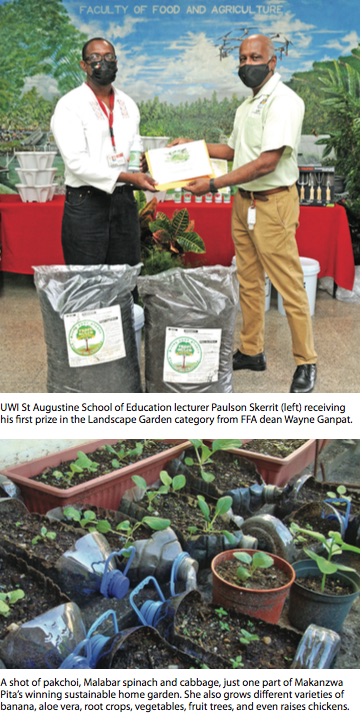Claire Craig has always liked gardening, seeing it as therapeutic and a way to enjoy nature and the outdoors. So when COVID-19 hit, it seemed like a good outlet in these stressful times.
“I decided to start a kitchen garden,” says Craig, a member of the UWI St Augustine community employed as a manager in Campus IT Services.
She planted ochro, pigeon peas, pimento, sweet pepper and tomatoes. She also had a container garden with pakchoi, chive, chadon beni and basil. It didn’t go smoothly:
“Because this was a very small space, there were too many plants in such a small area, and within a very short time, it was unmanageable.”

Craig, however, and many other members of the campus community, would find new encouragement and a host of resources to start gardening. From July to August 2020, UWI’s Faculty of Food and Agriculture (FFA) held “Grow Your Garden”, a competition created to promote small-scale, home food production and healthy eating.
“For some time now, local food production has been on the national agenda. This has only intensified because of the COVID-19 pandemic and the risk to our food security because of the amount of food we import,” says Professor Wayne Ganpat, Dean of the FFA. “We have been contributing to the national discussion, but we saw that we could also do something for our own people. So we developed a home food production initiative on the Campus.”
Ganpat and the FFA have for some time now been major advocates for food security, local agriculture, the evolution of agricultural technology and practices, and agri-business through new crop-based products, manufacturing and support industries. Every year (postponed in 2020 due to COVID-19), the faculty hosts the techAGRI Expo, one of the region’s biggest public events for food business, ideas and technology. FFA also produces and sells several crops, livestock and manufactured products, hosts technology and innovation parks, and has several programmes of study focused on bringing new professionals and ideas to the food and farming sector.
Globally, calls for food security have become more urgent as climate change, conflict, globalisation, lifestyle-related disease and economic uncertainty have forced us to question what we feed ourselves and where it comes from. Trinidad and Tobago imports over 80 percent of its food, costing close to TT$5 billion a year.
Initiatives like Grow Your Garden, although small, have the potential to make people think differently about food and maybe even find their green thumb.
“We really just wanted to get people involved, get them educated and to see that home gardening is not rocket science,” says Ganpat.
Grow Your Garden did reach such people, as well as those who already had an interest like Claire Craig, who won first place in the Vegetable Field Crop category.
“I really enjoyed the experience,” she says, “seeing what others were planting, from the pictures that were shared in the group, and the advice and support that was provided from the Faculty in the plant clinics.”
The competition was almost entirely virtual. Gardeners received technical support and information online. Dean Ganpat was the presenter in several food production videos that were shared on social media. Every two weeks, a plant clinic was held to help the participants with their gardens and give feedback on their progress. The competitors uploaded photos of their work and were judged online. Even the prize giving ceremony took place online, with the 18 winners coming onto Campus individually to collect their prizes.
Over 32 St Augustine staffers took part, competing in seven categories. Among them was Makanzwa Pita, who was the winner of the Environmentally Sustainable Farming category.
“I started seriously gardening about 4 years ago,” says Pita, a technical assistant at the FFA. “As a child, I always saw my grandmothers gardening. I guess it is in the genes.”
Her winning garden is extremely sustainable, minimising waste by putting what is produced back into the land:

“The chickens provide me with eggs and I feed them with the weeds and fruits from the garden. I also use the chicken poop along with kitchen scraps to make compost. I try my best not to waste. I use a mixture of vermicomposting and composting to fertilise the crops.”
Not all the winners have a long background in gardening. Shastri Motilal, winner in the Soil-Less category, became interested in hydroponic gardening in 2017 after seeing it in action at the techAGRI Expo.
“I always had an interest in growing but had bad experiences with soil,” says Motilal, a lecturer in family medicine at the Faculty of Medical Sciences. “For this reason I got interested in hydroponics. I also found out that the yield and grow times can be better than soil. Less water is needed and certain plant diseases are less likely so little or no insecticides [are required].”
Hydroponic systems grow crops without the need for soil, using nutrient solutions in water containers. Extremely efficient, they allow farmers to bypass the need for fertile land, removing a major hurdle for food producers.
Ganpat says there is a way to take part in gardening for every type of home environment: “Whether you have a small space or a large space, if you live in an apartment with a verandah, there is room for a garden.”
And although the first Grow Your Garden competition was held on campus, he sees the potential for it to expand to the other UWI campuses in the region and even possibly the wider society through private or public sector organisations. However it grows, the competition’s message of food self-sufficiency is crucial.
“Times are changing. We really have to see about our food supply,” says the FFA Dean. “It is becoming more risky to depend on external sources of food.”
| Category | Place | Winners | Item | Collection |
|---|---|---|---|---|
| Container garden | 1st place | Mrs Maria Peter-Joseph | Planter Grow Container+ Compost | 10:15 AM |
| 2nd place | Ms Shervette Lawrence | Stacky Pots + Compost | ||
| 3rd place | Ms Tanisha Lewis | Short Course (Hydroponics) | ||
| 3rd place | Mrs Charmaine Lord-Pope | Short Course (Hydroponics) | ||
| Soil-Less | 1st place | Dr Shastri Motilal | Large Hydroponic system + Short Course (Hydroponics) | 10:30 AM |
| 2nd place | Mrs Gaitri Benny | Pocket Ph and TDS Meter | ||
| 3rd place | Charon Ince-Christopher | Table-top Hydroponic System | ||
| Environmentally Sustainable Farming | 1st place | Makanzwa Pita | Compost + Bio Pesticide + Compost Manual | 10:45 AM |
| Mixed Crop | 1st place | Ms Kavita Maharaj | Compost + Pest Diagnostic Kit + Bio Pesticide | 11:00 AM |
| 2nd place | Mrs Lynette Joseph-Brown | Pest Diagnostic Kit + Bio Pesticide | ||
| 3rd place | Dr Keith Miller | Garden Tools + Bio Pesticide | ||
| Vegetable/Field Crop | 1st place | Mrs Claire Craig | Pest Diagnostic Kit + Bio Pesticide + Garden Tools | 11:15 AM |
| 2nd place | Dr Stephen Geofroy | Garden Tools + Bio Pesticide | ||
| Organic | 1st place | Ms Hazel Adiah | Vermicompost + Compost Manual + Short course (Composting) | 11:30 AM |
| Landscape Garden | 1st place | Dr Paulson Skerrit | Mulch*2 + Bio Pesticide + Short course (Landscaping) | 11:45 AM |
| 2nd place | Dr Sandra Gift | Garden Tools + Bio Pesticide | ||
| 3rd place | Mrs Christine Sahadeo | Mulch + Bio Pesticide | ||
| 3rd place | Ms Tammy Eli | Mulch + Bio Pesticide |